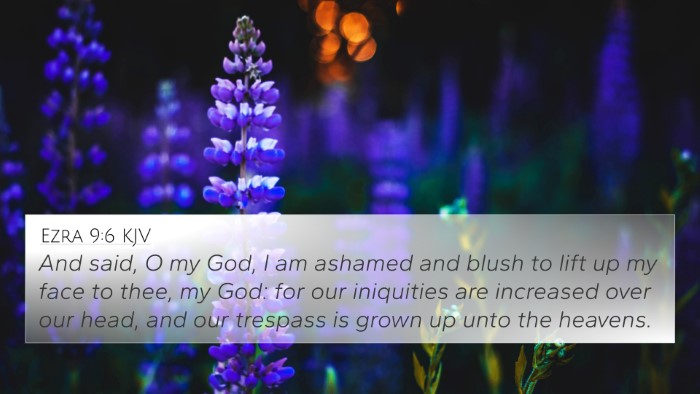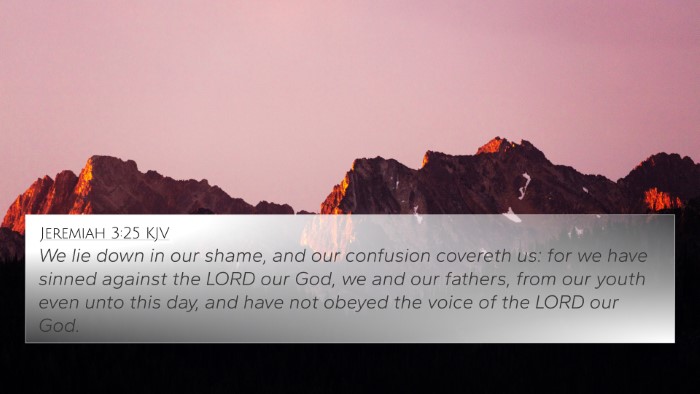Psalms 44:15 – A Meaningful Exploration
Psalms 44:15 states: "My confusion is continually before me, and the shame of my face hath covered me,"
This poignant verse expresses a deep sense of personal turmoil and disgrace. To understand its depth, it is essential to draw from various biblical commentaries to discern its meaning and implications, particularly in the context of the entire Psalm.
Commentary Insights
Various esteemed commentators provide connections to Psalms 44:15, revealing layers of meaning that speak to both individual experience and communal struggles.
-
Matthew Henry:
Henry reflects on the sentiments of the psalmist, emphasizing that confusion and shame often arise from a sense of abandonment by God during times of distress. He notes that such feelings are common when Israel faced opposition and discouragement, highlighting a divine absence perceived during tough times. This emotional state illustrates the psalmist's plea for God's intervention amidst feelings of despair.
-
Albert Barnes:
Barnes elaborates on the collective shame felt by the nation of Israel. He interprets this verse as an acknowledgment of the consequences of sin and rebellion. The shame is not only personal but communal, suggesting that the people are bearing the burden of collective guilt, which further compounds their sense of confusion and vulnerability before both God and their adversaries.
-
Adam Clarke:
Clarke offers insights on the emotional weight conveyed in the verse. He emphasizes that shame can lead to a loss of dignity and self-worth, impacting the individual's relationship with God and their nation. Clarke posits that through this expression of shame, the psalmist recognizes the need for divine mercy and restoration, highlighting a call for introspection and repentance.
Related Bible Verses
Understanding Psalms 44:15 in relation to other scripture enhances our grasp of its thematic connections. Below are some relevant cross-references that inform this verse’s meaning:
- Psalms 38:4 - "For mine iniquities are gone over mine head: as a heavy burden they are too heavy for me."
- Psalms 42:9 - "I will say unto God my rock, Why hast thou forgotten me? why go I mourning because of the oppression of the enemy?"
- Psalms 55:5 - "Fearfulness and trembling are come upon me, and horror hath overwhelmed me."
- Ezekiel 36:32 - "Not for your sakes do I this, saith the Lord God, be it known unto you: be ashamed and confounded for your own ways, O house of Israel."
- Lamentations 3:21-23 - "...this I recall to my mind, therefore have I hope. It is of the Lord's mercies that we are not consumed..."
- Job 30:20 - "I cry unto thee, and thou dost not hear: I stand up, and thou regardest me not."
- Isaiah 59:2 - "But your iniquities have separated between you and your God, and your sins have hid his face from you, that he will not hear."
Thematic Connections
The themes of shame, confusion, and the quest for divine intervention resonate throughout the Scriptures. The psalmist’s lament serves not only as a personal struggle but encapsulates the broader narrative of Israel's history where collective sin leads to suffering.
This verse acts as a catalyst for exploring how individual feelings of abandonment can reflect a larger communal experience of disconnect from God. Such thematic exploration leads to a greater understanding of God’s character and the collective hopes of His people for restoration.
Inter-Biblical Dialogue
The connections drawn from Psalms 44:15 to other Biblical texts create an inter-Biblical dialogue that reveals patterns of human emotion in relation to divine expectation. This dialogue emphasizes the shared human experience of doubt and the continuous call for divine help, making it relevant across both Old and New Testament writings.
Conclusions
Psalms 44:15 stands as an impactful reflection of human emotion struggling against the backdrop of divine purpose and historical experience. The insights from public domain commentaries illuminate the multi-faceted aspects of confusion and shame, pushing us towards a deeper understanding of repentance, redemption, and reliance on God.
Tools for Further Study
For those wishing to delve deeper into cross-referencing Scriptures, consider utilizing tools like a Bible concordance or a cross-reference Bible study system. These resources provide a central guide to exploring the many connections between verses, enhancing your understanding of Biblical themes.










